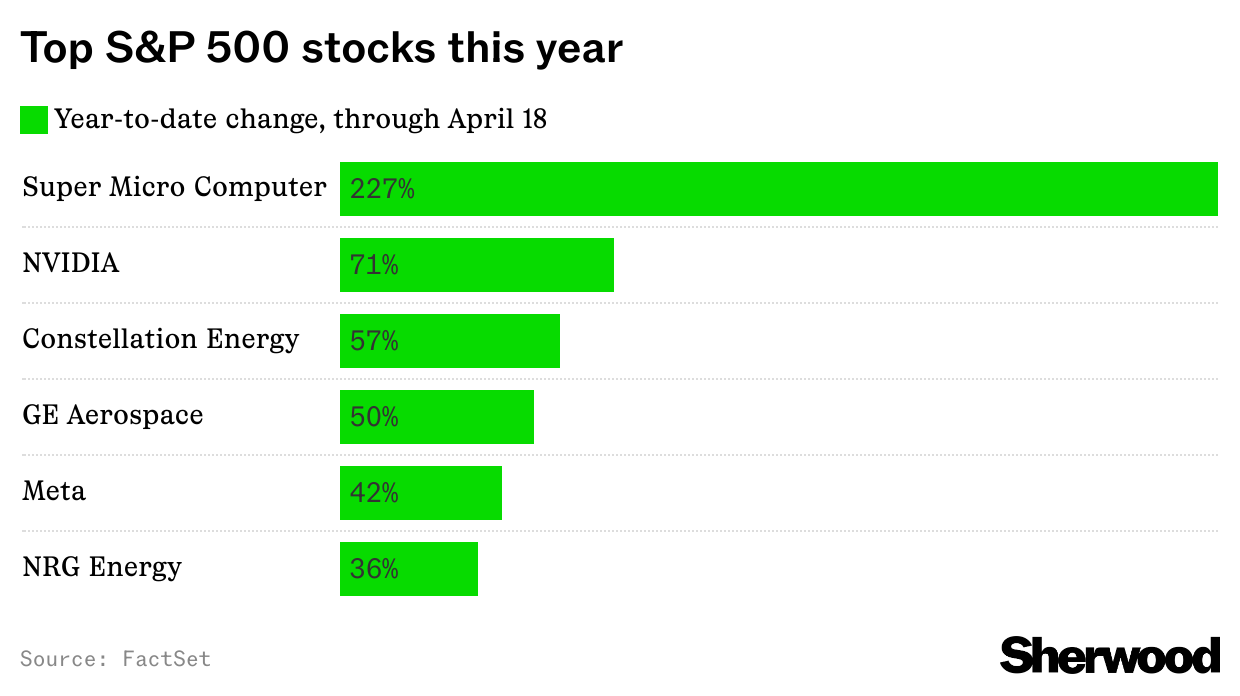Hey Snackers,
Big financial news day for Animal Crossing residents: the Bank of Nook slashed interest rates on all savings accounts. To apologize for the inconvenience, the bank gifted disgruntled savers a floor mat shaped like a bell. Island residents are now turning to the "stalk market," a marketplace to trade and invest in... turnips.
Real-world markets surged on positive results from a Gilead trial of its possible COVID-19 treatment (Dr. Fauci highlighted remdesivir's significant effect in reducing recovery times). This overshadowed news that the US economy shrank 4.8% in the 1st quarter — the most dramatic GDP shrinkage since the '08 recession.
FYI, your Snacks Daily podcast co-hosts are meeting up with Mrs. Dow Jones on Zoom @ 4pm EST today — we're whipping up takeaways on the corona-conomy. Click here to get involved!
Watch
Trolls, the sequel: AMC (aggressively) strikes back against Universal
Grab the popcorn... Things are getting spicy between AMC Theaters and Comcast's Universal Pictures. Yesterday we talked about the unexpected triumph of the Trolls World Tour movie, and how it could change "movie math" forever:
- Because of theater closures, Universal released its Trolls sequel directly to streaming services, instead of respecting the usual 75-day "theatrical window."
- Universal made more $$$ on 3 weeks of the sequel's online rentals (for $19.99) than it did after 5 months of the original Trolls' theater release (theaters take a bigger cut than streamers).
Who knew Trolls could cause so much drama?... NBCUniversal CEO Jeff Shell was so thrilled with the digital success that he said Universal will release movies in both theaters and digital when theaters reopen. AMC, the world's largest movie theater chain, was not about it (at all) — So its CEO wrote an aggressive open letter:
- Charm: It started with that, with the letter addressed to "Dear Donna" — then it went from passive aggressive to aggressive.
- The Indignation: AMC's CEO called Universal's decision to cut out theaters in the future "categorically unacceptable." So...
- The Strike: "Effective immediately AMC will no longer play any Universal movies" in any of its theaters around the world.
- Plus: "Any movie maker who unilaterally abandons current windowing practices" will be subject to AMC's wrath. Wowza.
Pre-emption is key... AMC struck fast and hard against normalization of the one thing that could destroy its biz forever: digital releases. Movie theaters aren't in the strongest position right now — but they can set expectations ASAP. Regal Cinemas also warned Universal to respect the theatrical window. Now Universal is backtracking, saying it "absolutely" believes in the theatrical experience and AMC misunderstood.
Burn
Boeing's got a big cash burn problem — but it's still better off than many corona-hit companies
A double, wouble-whammy... Boeing's dealing with it. The plane-making giant posted its 2nd consecutive quarterly loss and burned $4.7B in 3 months. Last year, Boeing enjoyed positive cash flow — more $$$ was coming in than out. But to start 2020 it burned a $4.7B-sized hole. Investors were actually relieved — given Boeing's 2 major issues, they were expecting losses to be even worse:
- Coronavirus: Airlines aren't ordering planes because nobody's flying. Boeing's plane deliveries dropped 66% this quarter, from 149 last year to just 50 this year.
- 737 Max: The disastrous plane model was grounded after 2 crashes and now drains Boeing's wallet, piling up in billions of losses (picture hundreds of planes stuck in a parking lot).
Feeling the (cash) burn... Spending more than you make is not sustainable forever. The more cash you burn each month, the quicker your cash pile is going to run out.
- Like people, companies have expenses that they have to pay each month, even if they're not bringing in any money. Think rent, debt payments, and "keep-the-lights-on" expenses.
- Boeing is kind of like someone who got laid off, but still has to pay rent, food, and utility bills. That's why it ditched dividends and is now cutting 10% of its 161K employees.
Cash is the difference between surviving and flopping... At least in the corona-conomy. Boeing still has it better than most corona-hit companies: it's got $15.5B in cash and a $9.6B credit line (aka some runway to survive). Plus, as America's 1 big commercial plane manufacturer (and the 2nd largest on Earth), Boeing is too important for the US gov to let it sink. Small businesses won’t be so lucky if they run out of cash.
Listen
Spotify knows our listening habits have changed — but it's not crying about it
"Every day now looks like the weekend”... Dope quote straight out of Spotify corporate. Because of WFH, lockdown life has all but erased commuting habits — so our listening habits have changed too:
- Podcast listening is down, especially in cars and on smartwatches. Buuut — Spotify listening through TVs and game consoles is up more than 50%. Despite the dip, Spotify didn't lose any paid subscribers or monthly users. In fact...
- Spotify grew its paid subscribers by 31% since last year — it now has 286M monthly users (some on the free version) and 130M paying subscribers. The result was a fresh $490M profit (its 2nd ever).
Same biz, different biz model... Spotify and Netflix are both content streamers with monthly subscriptions that cost roughly the same price. And they're both relieved that they haven't been hit by the corona-conomy. But unlike Netflix...
- Spotify doesn't own/create much of its content — the record labels do. So Spotify has to share revenue with companies that rep the musicians in your playlist.
- Spotify has a free version supported by ads — that makes it more vulnerable to the ad-pocalypse: its ad sales dropped 32% since last quarter. Still...
Spotify has no reason to play "sad vibez" playlist... Despite a few pandemic-related hiccups, Spotify's 1 key metric (paid subscribers) is looking good: paid subscribers grew 31%, which is better than last quarter's 29% growth — and that's what investors are looking at. Spotify's stock soared 12% on the earnings beats.
What else we’re Snackin’
- Word: Microsoft's sales jumped 15% — the tech giant's shares are now up 12% so far this year, while the S&P 500 is down 9%.
- Unshare: Uber may lay off 20% of its 27K employees and Lyft already laid off 17% as the sharing economy continues to crater.
- Beefy: President Trump uses the Defense Production Act to force meat processing plants to stay open in order to prevent a meat shortage, despite their COVID-19 worries.
- Advantage: Facebook sales for the quarter were up 18% from last year — after an ad-pocalypse plunge in March, Zuck says ad sales have stabilized in April.
- Afford: Ford expects a $5B loss for the quarter — and it's cancelled plans to develop an all-electric SUV with Rivian.
- Elon'd: Tesla reports a surprise quarterly profit — then Elon lashed out at the government for not letting him reopen Tesla's Bay Area factory now.
🍪 Thanks for Snacking with us! Want to share the snacks? Invite your friends to sign up here.
Thursday
- Weekly jobless claims
- Earnings expected from Amazon, Apple, Visa, Gilead, Comcast, Twitter, Shell, McDonald's, Altria, and Kraft Heinz
Disclosure: Authors of this Snacks own shares of Amazon, Apple, Twitter, and Spotify
ID: 1171395
.png)

